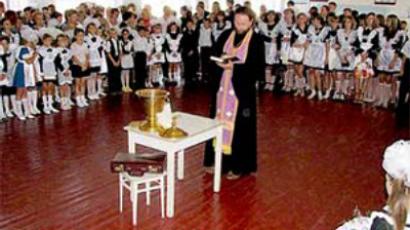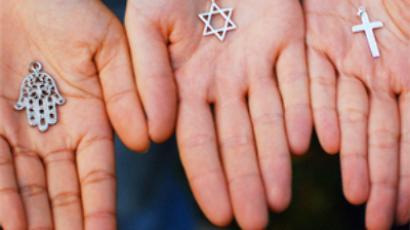Religious education debate far from over
With schools preparing for the new academic year, the debate continues over whether religious education in Russia should be taught more widely – and whether it should become a school subject.
Unlike in many European countries, high school teaching of religion is not available in most Russian schools.
Russia’s President Dmitry Medvedev has suggested setting up an experiment in selected regions by including the basics of religious culture, religious history and basics of secular ethics into the school programs.
“I find it possible setting such an experiment. So far 18 regions are on mind, but the number can be discussed,” said Dmitry Medvedev.
On Tuesday, the President underlined, that “students and their parents must choose the subject by themselves.”
“This means it can be the basics of Orthodox culture or the basics of Muslim, Judaist or Buddhist culture,” explained Medvedev.
Another variant is also possible, he said.
“Most certainly many would like to study the variety of Russian religious life. For such students the general course of history of major traditional confessions of our country can be developed,” said the President.
For those who don’t have specific religious beliefs, can choose the third variant – studying secular ethics, Medvedev said.
If experiment proves to be a success, starting from 2012 religious education could be added to the school programme.
Two sides of a coin
There are four official religions in Russia – the dominant one being Orthodox Christianity, along with Islam, Buddhism and Judaism.
All kinds of religious faiths were repressed during the 70 years of Soviet rule, but since the fall of communism there has been a growing call for them to be taught.
“The foundation of each life is our understanding of good and evil. This is a key element of religion. In this modern age, people can easily find out that most arguments, most wars and conflicts, are the result of misunderstanding. If people have common sense, they can always discuss their problems and live in peace,” says Father Sergey Ribico, an Orthodox priest.
Veronika Agafonova, a mother of three, sends her children to one of Moscow’s private Orthodox Christian schools.
A devout believer herself, she feels the principles of religion will help restore cultural values and offer a higher level of education.
“Pupils pray before meals, before the beginning of the classes. Of course, if the family does not practice things like that at home, their child can find our school strange, but when children get information, they get a right to choose – it means that they are free,” Veronika says.
Others feel religious knowledge shouldn’t be something enforced, especially on children.
“A man should study the history of world religions, but the question is – at what age? Private schools can have religious classes because it was the parent’s decision to send their children there. But we can’t have theological education in public schools because we live in a secular state,” says Professor Yury Nisnevich from the People’s Friendship University of Russia.
Age might be one factor up for debate – but there is also the thornier issue of which religion will be discussed in schools.
Some members of Russian society are concerned that Orthodox Christianity might dominate and further increase the church’s influence in the country’s culture. Instead, unity between all faiths needs to be the key.
“People need to feel that the state cares about them and their children. This turns people into patriots. If we fail to do that, this will be a huge drawback for everyone,” says Imam Anavar-Khasrat Salaev, head of the Muslim community in Moscow.














